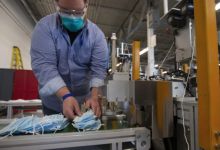Federal cabinet considers leveraging military in mobilizing health manufacturing sector against COVID-19
As both Italy and the United States harness the manufacturing power of their defence sectors to address shortages of medical equipment desperately needed to fight the COVID-19 pandemic, Prime Minister Justin Trudeau signalled Thursday he’d be prepared to do the same thing as the federal government ramps up its response.
“We are considering any measures necessary to ensure Canadians and our health care systems have the supports they need,” the prime minister said at his now-daily media briefing outside of Rideau Cottage, where he remains in self-isolation after being exposed to the virus.
“We have already been engaged with industry on production and ramping up capacity to build and create more equipment. We will, of course, look at military procurement as a solution as well. There’s a range of things we can do and we will do what is necessary.”
All options on the table
Deputy Prime Minister Chrystia Freeland reinforced that message later in the day, saying cabinet is working hard on getting the necessary medical equipment “and we’re looking at every single option, every single possibility.”
The cabinet committee struck to manage the novel coronavirus crisis was due to hear a presentation from Public Services Minister Anita Anand on procurement Thursday afternoon. The prime minister suggested in his remarks his government would have something more to say on the subject in the coming days.
Freeland, meanwhile, said Thursday the cabinet is “going to look at what the military can do” — one of the government’s most direct references to date to the possibility of calling on the nearly 100,000 regular and reserve members of the Armed Forces to help with the pandemic response.
The Italian government recently tasked the country’s military with helping a local manufacturer ramp up production of pulmonary ventilators — life-saving devices in short supply in many countries.
Demand can still be met within Canada: Hajdu
Public health officials in Canada have stressed all week that Canada is not running short of ventilators and have said that provinces have been able to tap into a federal equipment reserve to access the devices.
On Wednesday, Health Minister Patty Hajdu suggested that future demand for medical equipment could still be met by manufacturers in Canada.
In Washington that same day, U.S. President Donald Trump signed the Defence Production Act, a sweeping piece of legislation which allows the U.S. military to produce (among other things) personal protective equipment, including face masks, to slow the spread of the pandemic.
Earlier this week, the U.S. Air Force flew 500,000 swabs for COVID-19 testing kits from Italy to Memphis, Tennessee. Many of the companies that manufacture the kits have factories overseas, and getting them into the U.S. and on commercial cargo jets for distribution is a priority.
The Air Force says it will transport test kits in support of U.S. Homeland Security and the Health and Human Services Department in order “to make sure that we’re meeting the demands that they have.”
Canada has similarly sweeping legislation that allows the defence minister to “buy or otherwise acquire, utilize, store, transport, sell, exchange” and dispose of defence equipment.
The Canadian law also gives the Department of National Defence the power to “manufacture or otherwise produce, finish, assemble” such equipment in an emergency.
No time to ‘quibble’ over jurisdiction: Freeland
Freeland said no option is off the table.
“Let me be very clear with everyone that we will spend whatever it takes to support the health and safety of Canadians,” she said.
While acknowledging divided jurisdictions and political differences, Freeland said the federal government is not going to “quibble” over federal and provincial spheres of responsibility and “the federal government is prepared and is taking the lead, and that very much includes the health care system.”
Hajdu said her officials are working with provinces and territories to determine what kind of equipment they might need to meet the surge in new cases, but noted provinces have been tapping into the federal stockpile.
“It’s very difficult to talk about exact numbers because it’s like a revolving door,” she said Thursday. “There’s materials coming in and just as fast as they’re coming in, they’re going out.”
There does not appear to be a nationwide estimate of how many ventilators might be required because individual provinces are responsible for their own health care systems.
“I think trying to ask for a specific number is a bit misleading for Canadians because so much depends on … our efforts to flatten the curve,” Hajdu added, referring to the goal of preventing a sudden spike in cases that would overwhelm hospitals.
Canada’s Chief Public Health Officer Dr. Theresa Tam said the federal government has received no specific requests from provinces for ventilators and that a mechanism is in place that would allow provinces to share the devices. The federal government also is adding to its own strategic stockpile by ordering more, she said.
Separately, Tam said, the government has made a procurement request for seven million face masks — an order that is only 75 per cent filled.
Canada’s business community volunteered its services earlier this week and federal officials have been talking to a number of companies, with a focus on those already producing protective equipment.
CBC








Redes Sociais - Comentários